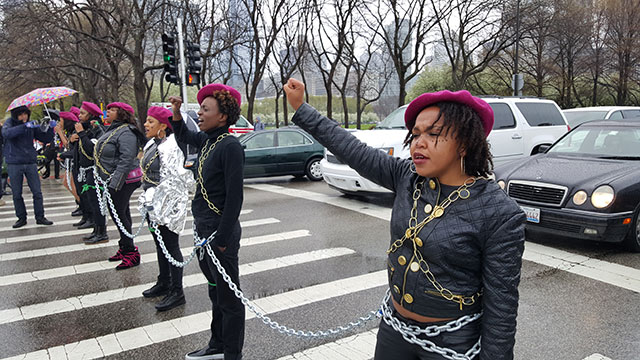
Honest, paywall-free news is rare. Please support our boldly independent journalism with a donation of any size.
While Beyoncé fans around the country were downloading and streaming her much-discussed new album Lemonade, the music and imagery of songs like “Freedom” and “Formation” found a new expression on the streets of Chicago on April 30 when young Black organizers disrupted the NFL draft to demand justice for their communities. Borrowing and reinterpreting the singer’s lyrics and the Black power aesthetics of her February Super Bowl halftime show, organizers shut down one of Chicago’s main traffic arteries with a collision of pop culture and grassroots resistance.
From the visuals of Black mothers offering remembrance of their children killed by police in “Forward,” to the image of a Black child disarming a line of riot police with a dance performance in the video for “Formation,” Beyoncé has undeniably tapped into the emotional energy of the movement for Black lives. It appears that movement organizers have now tapped into the cultural momentum of Beyoncé’s work, by merging her art with their resistance in the streets.
A coalition of young Black organizers from Chicago-based groups like Assata’s Daughters, Black Lives Matter: Chicago and Fearless Leading by the Youth — an alliance that recently pulled off a David-and-Goliath campaign to bring down Cook County State’s Attorney Anita Alvarez — orchestrated the shutdown and spectacle as part of their current campaign, which aims to merge two local struggles in both theme and focus. Citing the monetary issues involved in both controversies, the coalition of young activists, which has referred to itself publicly as “The Collective,” has brought together demands surrounding the firing of Chicago police officer Dante Servin, who gunned down an unarmed Black woman named Rekia Boyd, and the fight to save Chicago State University — a school they say has provided invaluable access to education for young Black people.
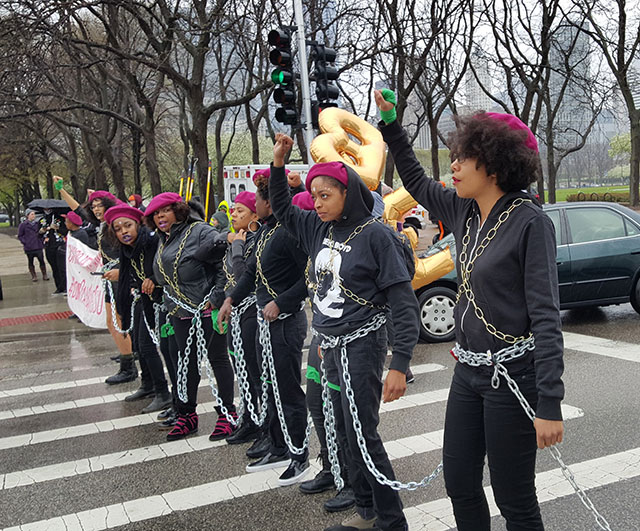 Protesters chain themselves together and raise their fists in a show of Black power. (Photo: Kelly Hayes)
Protesters chain themselves together and raise their fists in a show of Black power. (Photo: Kelly Hayes)
As part of their escalating campaign to see Servin fired, and funds allocated to Chicago State, organizers set their sights on the NFL draft, which was hosted in Chicago from April 28 to 30. In addition to providing a spotlight opportunity for protest, the event also provided organizers a chance to highlight the financial priorities of both Mayor Rahm Emanuel and the Chicago City Council. On the day of the Lake Shore Drive action, Collective members released a statement indicating that “there will be no silence while Mayor Emanuel and the city council are cutting a $302,000 deal for an event worth $3.2 million at the same time that we cannot afford to fund Black education.”
As visitors streamed into Chicago to take in the excitement of “Draft City” on April 29, which was staged in the city’s downtown area, local residents were reeling from the newly announced layoffs of 300 Chicago State University employees. Organizers were quick to point out that while the City of Chicago and the State of Illinois cite the state’s ongoing budget crisis when they slash local services, officers like Dante Servin, who have committed crimes against the community they are charged with protecting, remain employed by the Chicago Police Department.
It’s been four years since Servin, intoxicated while off duty, gunned down 22-year-old Rekia Boyd with an unregistered weapon, after complaining that she and her companions had made too much noise in a local park.
The conjoined demands of the young coalition fall in line with recent campaigns by groups like Black Youth Project 100, which have demanded that municipalities “defund the police” and instead “fund Black futures.”
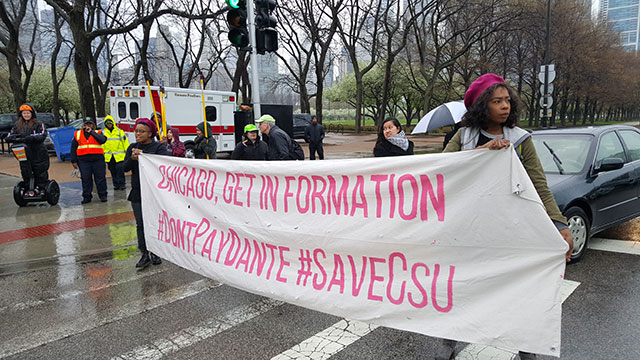 Lanes of traffic that were not blocked by chained protesters were shut down by banners bearing the group’s messaging. (Photo: Kelly Hayes)
Lanes of traffic that were not blocked by chained protesters were shut down by banners bearing the group’s messaging. (Photo: Kelly Hayes)
After a series of educational efforts, public appearances and the deployment of banner imagery calling for Servin’s firing and the restoration of funds for Chicago State, women and femmes from the all-Black coalition escalated their fight on April 30. The street blockade was both tactical and stylized in its vision, with blockade participants wearing outfits resembling those of Beyoncé’s backup dancers during her Black power-themed Super Bowl halftime show.
In addition to highlighting Black pride and the aesthetics of Black resistance, the action’s style was also a nod to a moment in pop culture when the norms of an NFL event were interrupted by a spectacle of Black strength and resilience. While Beyoncé’s performance was well received by many, a number of commentators complained that it interrupted an otherwise “wholesome” event with an inflammatory political message.
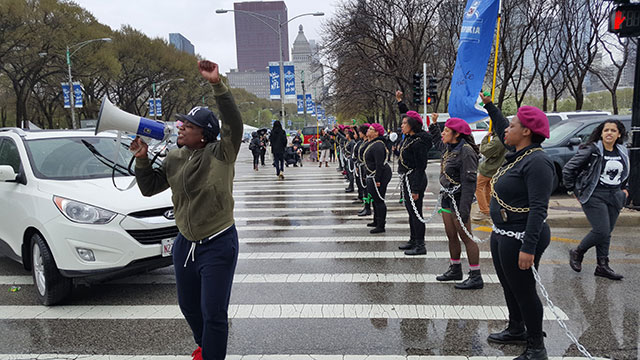 An organizer with Fearless Leading by the Youth leads chants as the blockade line forms and traffic comes to a halt. (Photo: Kelly Hayes)
An organizer with Fearless Leading by the Youth leads chants as the blockade line forms and traffic comes to a halt. (Photo: Kelly Hayes)
In an escalation of that supposed interruption of entertainment as usual, as many as 50 Black women and femmes stepped onto Lake Shore Drive — an expressway running parallel with the shoreline of Lake Michigan — with 17 members of the group elaborately chaining themselves together. Once deployed and locked together, side by side, members of the blockade line raised their fists in the air in a gesture of Black power and defiance. Blocking all lanes of traffic on the major roadway with chained protesters and banners bearing their messaging, the group loudly declared, “We’re in formation to demand your attention. Fire Dante Servin without a pension!” The reference to Beyoncé’s hit song “Formation,” coupled with imagery reminiscent of the singer’s controversial halftime show, represented a tactical escalation of a cultural phenomenon, with imagery and themes of Black resistance intersecting in both popular art and in the streets.
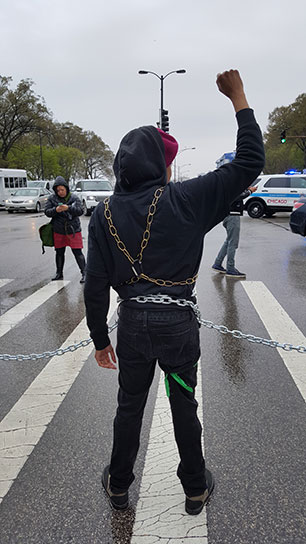 A protester awaiting arrest stands with a fist held high in defiance. (Photo: Kelly Hayes)The blockade line held the street until police cut all 17 protesters out of their chains and arrested them, as a supportive onlooker played a recording of Beyoncé’s power anthem “Freedom” through a bullhorn.
A protester awaiting arrest stands with a fist held high in defiance. (Photo: Kelly Hayes)The blockade line held the street until police cut all 17 protesters out of their chains and arrested them, as a supportive onlooker played a recording of Beyoncé’s power anthem “Freedom” through a bullhorn.
In a statement about the action, members of the coalition said, “Decision makers at the local and state levels have made it clear where their financial priorities lie. We continue to receive cuts to the institutions that keep Black women safe — institutions that continue to be replaced by terrorist cops who brutalize and murder Black women without penalty.”
Given the world fame of Beyoncé’s music, and the intensity of the movement for Black lives, an interplay between the two represents a fascinating escalation in the current political and cultural moment. The performer’s recent efforts have lifted up Black resistance efforts, both past and present. Now that the current culture of resistance has profoundly engaged with some of the performer’s latest work, what visions of resistance might evolve between pop culture and street organizing? For a sense of what’s possible, one need only remember that moment on Lake Shore Drive, when 17 Black women and femmes forced the Chicago police to play a performance role in their theatrical blockade — by literally breaking the chains that bound them.
Trump is silencing political dissent. We appeal for your support.
Progressive nonprofits are the latest target caught in Trump’s crosshairs. With the aim of eliminating political opposition, Trump and his sycophants are working to curb government funding, constrain private foundations, and even cut tax-exempt status from organizations he dislikes.
We’re concerned, because Truthout is not immune to such bad-faith attacks.
We can only resist Trump’s attacks by cultivating a strong base of support. The right-wing mediasphere is funded comfortably by billionaire owners and venture capitalist philanthropists. At Truthout, we have you.
Truthout has launched a fundraiser, and we have only 48 hours left to raise $22,000. Please take a meaningful action in the fight against authoritarianism: make a one-time or monthly donation to Truthout. If you have the means, please dig deep.